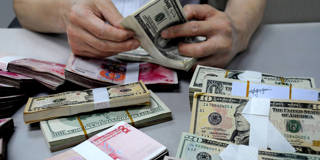By treating international trade as a zero-sum game in which the US makes its own rules, President Donald Trump's administration has weakened the incentive for countries to engage in policy cooperation. Why should China bow to a US that treats it as an enemy?
LONDON – The weaponization of currency has rarely ended well for the United States. Look no further than the unilateral 1971 decision of President Richard Nixon’s administration to cancel the US dollar’s direct international convertibility to gold – a key element of the “Nixon Shock” that destabilized floating currencies and led to stagflation later in the decade. But that hasn’t stopped President Donald Trump’s administration from (mis)labeling China a currency manipulator.
The US has long accused China of keeping the renminbi artificially low, in order to secure an unfair advantage in international trade. But it has generally refrained from harsh action, and, until this latest decision, had not applied the “currency manipulator” label since 1994. Even during the mid-2000s, when the renminbi was widely considered to be significantly undervalued, US President George W. Bush’s administration chose not to make that designation, and instead pursued the bilateral Strategic Economic Dialogue on currency and other economic issues.
But the renminbi’s recent drop below the psychologically significant threshold of CN¥7 to the dollar for the first time since 2008 was too much for the Trump administration to take. So, in a symbolic move that escalates America’s ongoing trade war with China, the US Treasury made the official designation.

LONDON – The weaponization of currency has rarely ended well for the United States. Look no further than the unilateral 1971 decision of President Richard Nixon’s administration to cancel the US dollar’s direct international convertibility to gold – a key element of the “Nixon Shock” that destabilized floating currencies and led to stagflation later in the decade. But that hasn’t stopped President Donald Trump’s administration from (mis)labeling China a currency manipulator.
The US has long accused China of keeping the renminbi artificially low, in order to secure an unfair advantage in international trade. But it has generally refrained from harsh action, and, until this latest decision, had not applied the “currency manipulator” label since 1994. Even during the mid-2000s, when the renminbi was widely considered to be significantly undervalued, US President George W. Bush’s administration chose not to make that designation, and instead pursued the bilateral Strategic Economic Dialogue on currency and other economic issues.
But the renminbi’s recent drop below the psychologically significant threshold of CN¥7 to the dollar for the first time since 2008 was too much for the Trump administration to take. So, in a symbolic move that escalates America’s ongoing trade war with China, the US Treasury made the official designation.